‘Journey of Faith’ features anecdotes and memories of County’s Rednersville Circuit
Administrator | Jul 16, 2020 | Comments 0
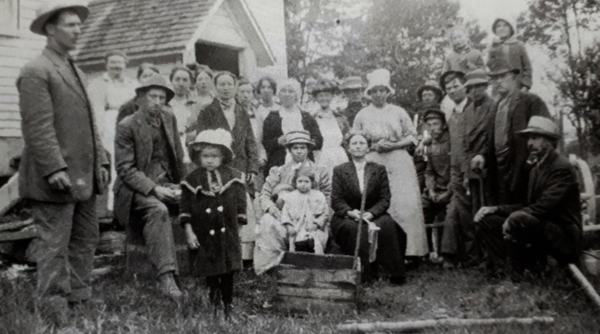
Victorian church members, early 1900s. – From Journey of Faith
Amusing recollections combine with a rich and colourful history of northern Prince Edward County and its spiritual underpinnings in ‘Journey of Faith’, a new publication which tells stories of the churches and communities on the Rednersville Circuit of the Wesleyan Methodist and, later, the United Church.
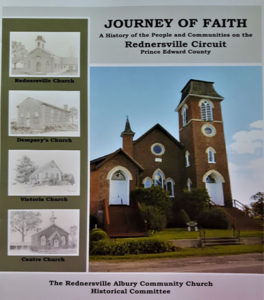 The importance of maintaining this heritage in written form for future generations is underscored in a 1903 quote by congregational minister and educator, Reverend George Cornish: “It is cause for profound regret that so few of our churches and Sunday Schools realize that they are making history. Hence but little data has been preserved.”
The importance of maintaining this heritage in written form for future generations is underscored in a 1903 quote by congregational minister and educator, Reverend George Cornish: “It is cause for profound regret that so few of our churches and Sunday Schools realize that they are making history. Hence but little data has been preserved.”
“Rev. Cornish’s sentiment became relevant to the committee that was formed to preserve the history of the Rednersville Circuit in book form,” said Sandra Latchford, president of the Prince Edward Historical Society. “The committee members were inspired to do so as a result of the lack of written records for the Circuit and the dwindling numbers of individuals able to provide memories of the four churches from which it had been formed.”
Rednersville, Albury, Centre and Victoria Churches were once spiritual focal points in Ameliasburgh Township, where thriving rural communities worshipped and gathered for social events.
Reflecting on treats provided at the end of church meetings, Audrey Carter recalls a member apologetic about a cake she made from scratch, then brought in to share.
When adding the teaspoon of salt, the lid fell off the shaker and plenty of salt fell into the batter.
“Carol spooned out what salt she could, then baked the cake. From my memory, the cake tasted fine. Many of us in our childhood and teen years grew up in families where money was in short supply, so making another cake was out of the question even if there was time,” said Carter.
Evelyn Peck reflected on why women’s groups always make more food than required for social functions.

Evelyn Peck
The rural church women’s groups were well-known for catering tasty and plentiful food, but an abundance of leftovers was often troublesome to some of the younger members who were to contribute, but were struggling to stretch their household food budgets.
Peck recalls she and her sister-in-law chaired a small wedding reception at Albury Church in the late 1960s, for a small wedding reception. Mindful not to be wasteful, they planned a salad plate luncheon artfully arranged with rolled ham, potato salad, coleslaw, jellied salad, lettuce, sliced tomatoes and cucumbers.
“On the day of the wedding we were there early to prepare the plates. When one of our members brought her jellied salad, it was unusable because it was not set, as she had forgotten to make it the previous night. Therefore, we had to recalculate and cut the other jellied salads into much smaller portions.”
As the guests began to filter into the room, they received a message that there were two more unexpected guests.
“We got out two more dinner plates and started ‘robbing Peter to pay Paul’. We didn’t have much extra food to work with and we couldn’t make the jellied salad pieces any smaller. So, extra tomato and cucumber slices were added to the last two plates.”
Unfortunately for the two, it was their mother-and-father-in-law who got the two extra plates and neither was fond of raw tomatoes.
“Our mother-in-law was president of our Ladies Aid. She was rather indignant that her daughters-in-law would have skimped on the food,” said Peck. “Now we knew exactly why one always prepared for more than was required. Our minister, Rev. Maurice McLeod, often teased us about that lesson learned!”
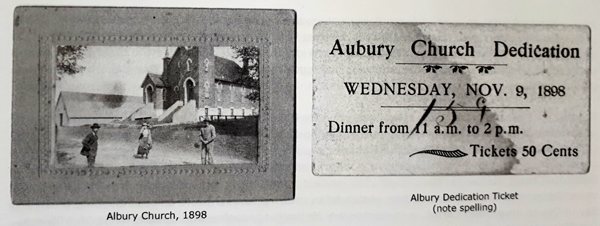
Over the years, three of the four churches have been closed and two of those three were destroyed, leaving nothing to mark the places where they stood for so many years.
Journey of Faith examines the roots and cultural history of the communities on the Circuit from the original four-church framework to the sole remaining congregation of Rednersville Albury Community Church.
Latchford notes it documents the journey of the first settlers who travelled to the north shore of Prince Edward County in search of a peaceful place to live and worship.
“They were, in effect, refugees – first from Europe due to religious conflict, then from their new communities in the Thirteen Colonies, where they had refused to fight against the British in the American Revolution and, as a consequence, were driven from their land.
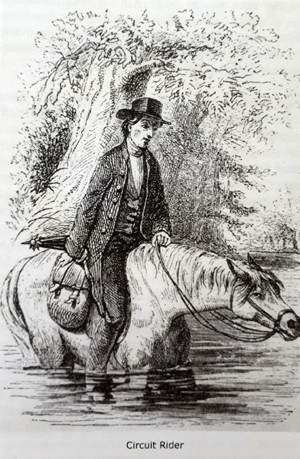 The book also tells of the early days when circuit riders travelled on horseback to bring the gospel to the settlers’ new home and the eventual construction of the four churches. While there are other written accounts of the church buildings, Journey of Faith goes further to relate fascinating stories of the people of the Rednersville Circuit and their community life. Descendants of those pioneers still reside in the area and worship at the remaining church.
The book also tells of the early days when circuit riders travelled on horseback to bring the gospel to the settlers’ new home and the eventual construction of the four churches. While there are other written accounts of the church buildings, Journey of Faith goes further to relate fascinating stories of the people of the Rednersville Circuit and their community life. Descendants of those pioneers still reside in the area and worship at the remaining church.
Community involvement for the people of the Circuit was vibrant and satisfying, and Journey of Faith explores the work, social, and spiritual lives they led.
The Rednersville Charge, recalls Ron Carter, always had an active Young Peoples group that met Friday evenings. Leaders Marjorie Caterer (nee Roblin) and Harry McKay had their hands full keeping the rambunctious group of teens settled down to seriousness.
Carter notes the teens “also loved to get the leaders busily occupied, then turn out the lights, as rumour had it that an older couple across the road kept their eyes on the windows of the church hall to see just exactly what the young people were up to.”
“The many personal anecdotes and lived memories in the book make for entertaining reading for those both with or without a connection to the Circuit’s faith history,” said Latchford.
Agriculture was the main livelihood but, as described in the book, people also engaged in other occupations including milling, trades such as tanning and blacksmithing, hotel and tavern keeping, carriage making and boat-building. Their social life revolved around the churches where they participated in activities such as concerts, dinners, teas, seasonal events and outreach projects at home and afar.
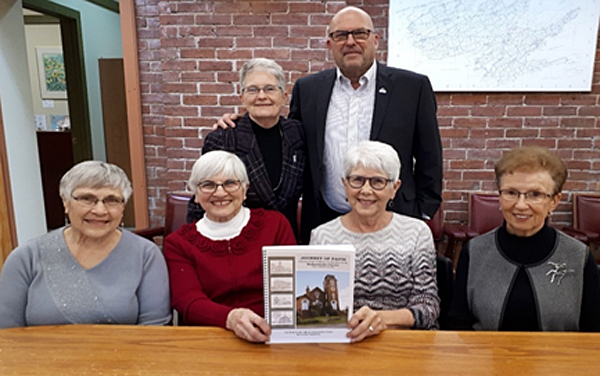
Journey of Faith authors shown in this photo (taken before COVID-19) include Audrey Carter, Evelyn Peck, Sharon Vanclief; Judith Zelmanovits, editor PEHS and at back: Sandy Latchford, President PEHS with Mayor Steve Ferguson, Past President PEHS.
The contributors to Journey of Faith are grateful to the Prince Edward Historical Society for its assistance in editing and the funding of printing the 100-page coil-bound book. It is available for $25 (tax included) and can be ordered by e-mailing jubu57@hotmail.com or telephoning Evelyn at 613-968-9402.
Filed Under: Arts & Culture • Featured Articles
About the Author:


































